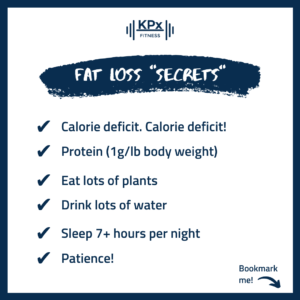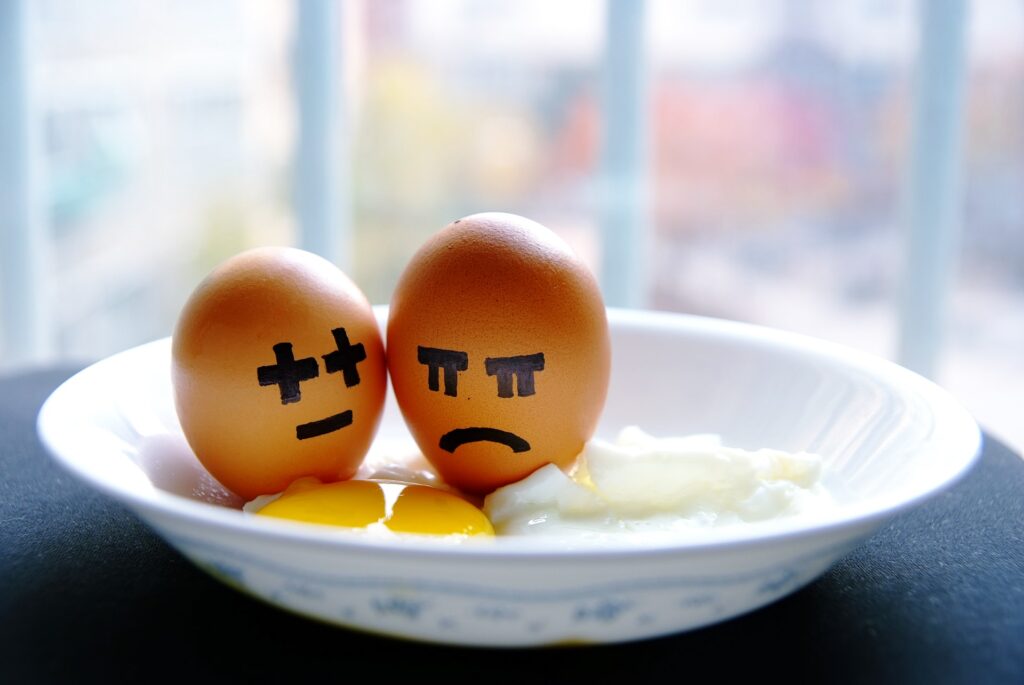So many of us who struggle to lose weight use our metabolism as an excuse for why we get stuck. Could your metabolism really be broken? A “broken metabolism” is highly unlikely. It’s time to bust some metabolic myths.
Myth #1: Your metabolism grinds to a halt as you age
Losing weight doesn’t get harder with age because your metabolism suddenly drops off a cliff. The reality is that weight loss gets harder because we tend to eat more and become less active as busy adults.
According to the American Council on Exercise, basal metabolic rate (the calories burned to keep you alive) decreases about 1-2% per decade. That is, after you reach 20 years old, your daily energy expenditure decreases about 150 calories per decade. That’s only 15 calories per year – not really significant in the grand scheme of things.
The truth? It’s not your “slowing metabolism” that’s making it harder to keep the weight off; it’s the fact that you spend more time sitting at a desk and have less spare time to play pick up basketball/volleyball with your friends.
This is good news because it means you can control your weight.
Myth #2: “I used to be able to eat whatever I wanted and not gain weight.”
False. Unless you were keeping track of the calories you ate in your 20s versus the calories you’re currently eating, you don’t know this to be true.
A possible (and more likely) explanation for why it may seem like you gain weight just looking at a donut these days is that people in their +30s who are trying to get healthy and lose weight turn to better/healthier foods without concern for portion sizes.
Since calories play the most significant role in weight management, 200 calories of ramen is technically better for weight loss than 400 calories in that healthy handful of almonds you just scarfed down.
Newsflash: healthy foods have calories, and calories count – even if you don’t count ‘em.
Myth #3: Eating small meals throughout the day increases your metabolism.
The science this is based on has been misreported to the public. Yes, eating food increases your metabolism during and immediately following eating, but this “thermic effect of feeding” is proportionate to the amount of food you eat.
It takes X energy to break down Y amount of food. In other words, if two people both eat 2,000 calories per day, they will require the same relative amount of energy to metabolize those calories, regardless of how many meals it takes them to consume 2,000 calories.
Eating more frequently only increases your opportunities to overeat! In fact, bodybuilders use this strategy to consume extra calories for muscle-building.
Spreading your meals throughout the day might keep you from getting too hungry and overeating. If so, it is a good idea. Athletes perform better when they eat more often in smaller amounts because they have a constant supply of energy. But if you’re prone to overeating, many small meals is not the strategy for you.
Myth #4: Eating certain foods can boost your metabolism.
Eating foods like green tea, caffeine, or hot chili peppers will not help you shed excess pounds. Some may provide a small, temporary boost in your metabolism, but not enough to make a difference in your weight.
Save your money on fat burners and spend it on quality groceries instead.
Myth #5: You can offset the calories you eat with extra exercise.
Well, yes and no.
At the most basic level, weight loss comes down to calorie balance. You do have to eat fewer calories than you utilize each day in order to lose weight. BUT exercise calories are only part of the picture, and we don’t burn nearly as many calories as we think (or hope!) through exercise.
Other factors in daily metabolism include:
- Basal Metabolic Rate (BMR) – the calories burned to keep you alive;
- “Non-Exercise Activity Thermogenesis” (NEAT) – calories burned through daily activities, like getting up from your desk to walk to the water cooler;
- Thermic Effect of Feeding (TEF) – calories burned digesting the food you eat.
Of these, BMR is the biggest factor – most adults burn at least 1200 kcal per day just existing (men more than women, and bigger people more than smaller people). Your workout? Probably closer to 100-200 calories burned (more if you’re a man or a bigger person – or going balls to the wall).
Point being, exercise plays only a small role in fat loss. This is why you should never “eat back” the calories you burned during your workouts if fat loss is your goal. Hang on to that calorie deficit!
Myth #6: I can’t lose weight despite eating [insert stupidly low number of calories]
More likely? You’re misreporting your calorie intake.
Don’t worry, it’s not just you. Studies show that “normal” weight people tend to underreport eating by ~150 cal/day, while overweight people under report calories by up to ~600 cal/day! This misreporting effect is more pronounced in women (sorry, ladies).
While I think you are a special and unique person, your body isn’t defying any laws of physics. If you’re not losing weight, it’s because you’re eating too many calories. And until you take the time to weigh and measure your food and track everything you eat for a week or two, you can’t know for certain how much you’re actually eating. (Eyeballing portion sizes doesn’t count as measuring, by the way.)
Eating too few calories is dangerous for all aspects of your health.
Remember basal metabolic rate (BMR) from above? That’s the amount of energy from food, measured in calories, that your body requires to maintain essential functions, like thinking and breathing. If you take in less than that amount, your body starts to draw from glucose and fat stores to get the energy it requires to keep you alive. So, short term, you start to lose weight.
But your body doesn’t like this, so it responds by down-regulating your activity levels. You’ll start to feel sluggish and not be able to workout as hard as you’d like or perform other physical activities with as much vigor as you used to. If you continue on this very-low-calorie diet, your body will start to shut down functions it deems less important than brain, heart, and lung function. Hormonal disruption is typical, resulting in a lower libido and/or loss of your menstrual cycle.
As you can see, very-low-calorie diets are not a healthy weight loss strategy. Most extremely restrictive diets can’t be sustained long-term, meaning you’ll regain all the weight you lost once you resume your normal eating habits. Worse, you may rebound by binging on all the foods you restricted from your diet, leading to a binge-restrict cycle that is physically and psychologically devastating.
What really works for weight loss?
Okay, things got dark there for a minute. Let’s fast forward to what you can do to burn fat, lose weight, and look and feel healthier.
At it’s most basic, weight loss comes down to calorie balance. You have to eat slightly fewer calories than your body requires for maintenance in order to lose weight. To figure out how many calories you need to lose weight, check out this article (don’t worry, it will open in a new window).
Simple strategies to eat fewer calories include:
- eating more nutrient dense foods like fruits and veggies;
- choosing leaner cuts of meat;
- switching to low-fat dairy;
- eliminating liquid calories and drinking sparkling water, tea, black coffee, or diet sodas instead;
- cutting back or completely abstaining from alcohol consumption.

Focusing your diet around nutrient-dense foods like fruits, vegetables, and high-fiber starches means you can eat as much food (volume) while consuming fewer overall calories.
When you’re in this “calorie deficit,” your body is in a catabolic state, meaning it’s breaking down body tissue (fat and muscle). You only want to burn fat, not muscle, though. Muscle is not only important for your health, but having lean muscle will also make you look more toned at the end of your diet.
To avoid muscle loss during a diet phase, you need to eat enough protein. This will help maintain lean muscle tone on a diet. Research shows that 0.8-1 gram of protein per pound of goal weight is the ideal amount of protein.
High-protein foods include:
- Poultry;
- Lean meat (loin cuts);
- Most fish;
- Eggs and egg whites;
- Greek yogurt or low-fat regular yogurt;
- Low-fat dairy;
- Some grains, like quinoa;
- Beans and legumes;
- Protein supplements (whey isolate or pea protein is best).
Beyond calorie control and eating adequate protein, everything else is minutiae. Things like macro- and micro-nutrients, meal timing, and supplementation won’t budge the scale if you aren’t in a calorie deficit. You can’t trick your metabolism with fat-loss “hacks.”
Other things that are important from a fat-loss perspective include getting enough sleep, staying hydrated, managing stress, moving daily, and resistance training several (2-4) times per week.
The truth is — your metabolism isn’t broken!
But your dietary approach might be.
Don’t blame your metabolism if you struggle to lose weight.
Blame your diet, and then do something about it.
Would you like help implementing this info so you
lose fat, build lean muscle, and feel more confident in your body?
KPxFitness offers strength training and nutrition coaching for all fitness levels. Every program is custom-designed to fit your goals and lifestyle. And everything you need is delivered online, so you can live/travel anywhere in the world and still get amazing results.
Click here to apply for coaching, and I will reach out to you personally if you’re a good fit for the program.

